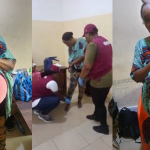No fewer than 3,657 workers on the payroll of the Federal Government are being prosecuted for not being captured by the Integrated Personnel Payroll Information System (IPPIS) set up for its workforce.
The workers are currently being investigated by the Independent and Corrupt Practices and related Offences Commission (ICPC), according to the Head of Service of the Federation (HoS), Dr. Folashade Yemi-Esan.
She also said following scrutiny by the IPPIS, another 1,618 applicants were found to have used fake letters to secure employment and for fraudulent enrollment in the IPPIS.
To date, Yemi-Esan disclosed that 874 officers have been suspended from payment platform.
Speaking at the ministerial media briefing organized by the Presidential Communications Team at the Presidential Villa, Abuja, on Thursday, the Head of Service said a total of 61,446 civil servants from the core Ministries, Departments and Agencies (MDAs) have so far been verified by IPPIS.
On the money being saved from the implementation of the IPPIS, she said about N180 million is being saved monthly by the government which translates to about N2 billion annually.
On the use of IPPIS for the payment of the nation’s university lecturers’ salaries, Yemi-Esan said the payment platform is suitable for them as it could accommodate their salaries and allowances as well as the peculiarity of the institutions.
“IPPIS can accommodate the salaries of university lecturers as against the University Transparency and Accountability Solution (UTAS) that they want and is yet to pass relevant integrity tests.’’
On the conviction of some federal permanent secretaries for fraud, Yemi-Esan, said that the Body of Permanent Secretaries at the federal level had studied what led to their conviction in a bid to prevent a recurrence.
“You know the position of a Permanent Secretary as an accounting officer is a very precarious one. When permanent secretaries are appointed, the first thing I tell them is that your position is one that should not be celebrated.
“It is one that should make you be even more cautious. Because even when somebody else has committed a crime, it is the Permanent Secretary that will be held liable for that and that is what the Procurement Act has done to permanent secretaries.
“We had a procurement retreat, where we talked about them in very great details. I think it is called precarious liability that when even somebody else commits a crime it is the Permanent Secretary that will be held responsible. That is what the Procurement Act says today.
“That is why even for the female Permanent Secretary formerly at the Ministry of Interior, Anastasia Daniel-Nwobia, who was jailed in respect of the charges of fraud arising from the conduct of the botched Nigerian Immigration Service recruitment exercise in 2014),’’ she explained.
“We had to get the details of the judgment so that we could examine it and see where permanent secretaries should be more careful.
Those are the issues that we face and we are learning lessons from all those cases, I think that is the most important thing.
“The good thing is that the permanent secretaries are not transactional permanent secretaries anymore. They are transformative permanent secretaries and I’m sure we will not have any of these problems with any of the permanent secretaries today.’’
























Leave a comment